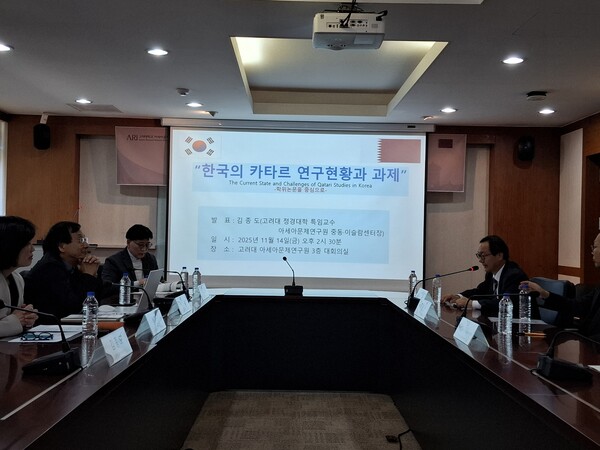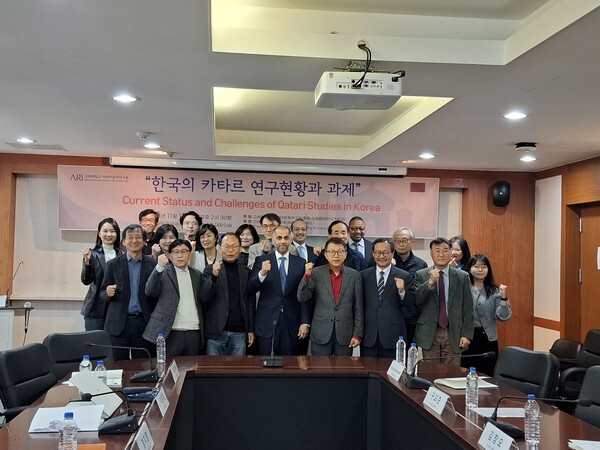Experts call for expanded Qatar studies and diversified bilateral cooperation beyond energy

A seminar marking the 51st anniversary of diplomatic relations between Korea and Qatar was held on November 14 at the 3rd floor conference hall of the Asiatic Research Institute (ARI) at Korea University. Hosted by the ARI’s Center for Middle Eastern and Islamic Studies and led by Professor Kim Jong-do, the event took place under the theme “The Current State and Challenges of Qatari Studies in Korea.”
In his opening remarks, ARI Director Lee Jin-han emphasized the timeliness of conducting comprehensive, multi-layered research on Qatar, stating that “selecting Qatar among Middle Eastern countries as a core research target is highly appropriate.” Former Dean Koo Kyo-joon, delivering a welcome address, added that the Graduate School of Public Policy is currently discussing the establishment of a Middle Eastern Studies major, citing Qatar’s strategic significance and the need to expand academic infrastructure.
Qatar’s Ambassador to Korea, Khalid Ibrahim Al-Hamar, noted in his congratulatory speech that “Qatar is Korea’s largest LNG supplier,” expressing hope that bilateral cooperation will extend beyond energy to broader cultural and economic sectors.
Three papers were presented during the seminar. Professor Kim Jong-do opened the session by reviewing the current landscape of Qatar studies in Korea. Despite 51 years of diplomatic ties, he pointed out that only three doctoral dissertations and 21 master’s theses have been produced, highlighting the insufficient research foundation. He underscored Qatar’s immense natural gas reserves, which he said could “supply Korea for 730 years,” stressing the need for sustained, in-depth research. He further noted that domestic studies remain concentrated in sports and media, particularly around the World Cup, with only two academic books available—an indication that expanding specialized research capacity and facilities is urgent.
In the second presentation, Professor Emeritus Lee Chung-yeol (School of Economics and Statistics, Korea University) addressed “Korea–Qatar Cooperation through the Lens of Economic Theory.” He observed that Korea’s trade structure with Qatar is imbalanced, with Korea heavily dependent on Qatari oil and gas imports while Korean exports remain modest. He argued that Korea requires resources while Qatar seeks capital income, proposing the creation of a strategic trade model that harmonizes the interests of both nations.
The final presentation by Jang Ji-hyang, Director of the Middle East and North Africa Center at the Asan Institute for Policy Studies analyzed Qatar’s diplomatic status and dilemmas in her presentation “The Limits of Qatar’s Pragmatic Balancing.” She explained that Qatar maintains ties with states across rival blocs as part of its balanced diplomatic strategy. However, she cautioned that such an approach alone cannot secure trust from all actors, suggesting that Qatar must adopt flexible strategies that combine balanced diplomacy with selective close alliances when necessary.
A panel discussion moderated by former Ambassador to Qatar Kim Chang-mo followed the presentations. Participants explored various pathways to strengthen Korea–Qatar cooperation, including expanding practical initiatives such as joint entries into third-country markets. Some speakers also warned against viewing Qatar negatively based solely on allegations of ties to armed groups.
The seminar was sponsored by the Korea office of Trends Research and Advisory (CEO Dr. Mohammed Abdullah Al-Ali).


